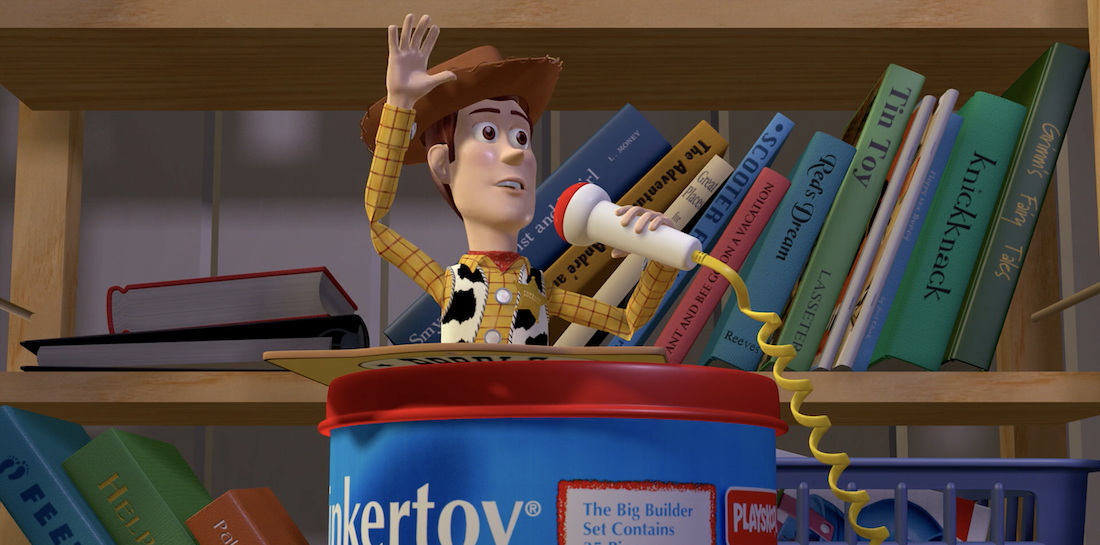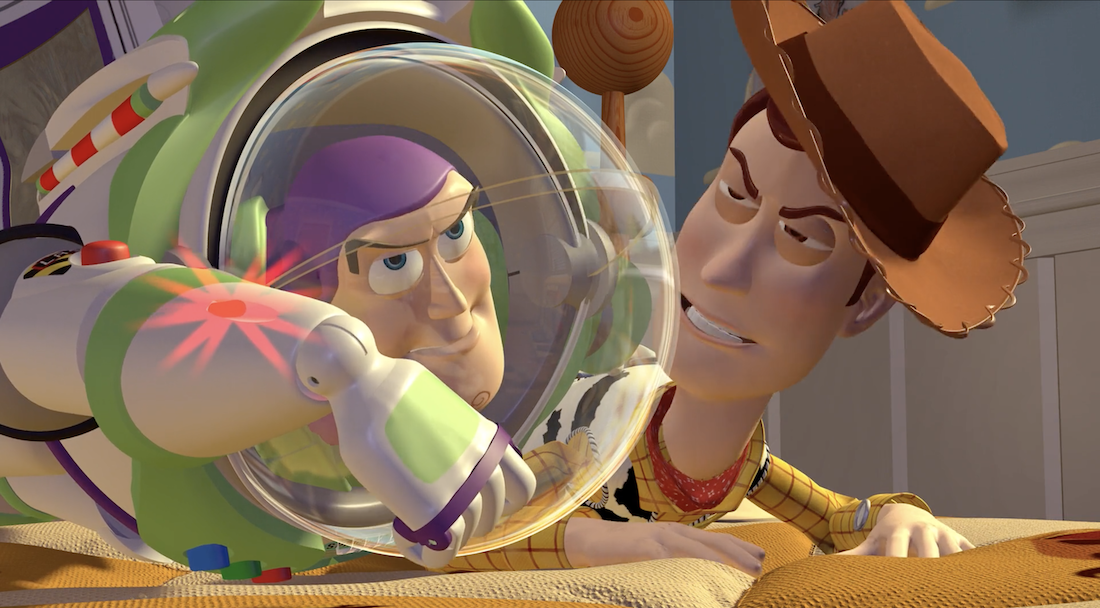TOY STORY (1995)
Sheriff Woody Pride’s Pride In TOY STORY
In preparation for the upcoming LIGHTYEAR movie release, I figured the best it’s the perfect time to go back and shine a light on arguably the most important character in the TOY STORY film franchise–Sheriff Woody Pride. Watching this series is almost a rite of passage for children but, as a Disnerd, I hadn’t revisited the first entry in the franchise since TOY STORY 4’s release, and Woody was a lot more selfish than I remembered! From the 1995 installment’s start, the main child, Andy, is playing with his toys in his room with Woody being the focus of his main attention and affection. When Andy gets called down by his mom, we see the toys spring to life and quickly establish a rigid power dynamic with Woody at the top and everyone else a rung below.
There’s no Handmaid’s Tale-like dystopian power structure here, but while the non-Woody toys entrust Woody to keep them in line for an upcoming move, you can see throughout the movie that Woody’s “spot” on Andy’s bed is physically and symbolically above the other toys on the floor, in the shelves, and in the toy box. Everything seems secure with Andy’s toys until they realize his birthday party is happening sooner than they thought and we see that Woody has a fear about a new toy possibly stealing Andy’s attention from him.
Andy charges into the room carrying his new Buzz Lightyear: Star Command toy and immediately slings Woody off the bed to make room for his new favorite.
The other toys immediately start commenting on Woody’s fall from grace and he responds in anger to accusations that he’s been replaced.
As we see Woody introduce himself to Buzz, his main point is to get Buzz to recognize that he’s in his “spot” on the bed as he is Andy’s favorite and the Sheriff attempts to assert his dominance in the situation. But the other toys’ awe and Buzz’s own lack of awareness that he’s a toy drown out the former bigwig of the playthings. Woody witnesses Andy play with Buzz, update his room with a space theme, and experience life as the target of Buzz’s lasers over an unspecified amount of time during which his depression and anger over the situation cultivate into a plan to get Andy’s attention back. Preying on Buzz’s ignorance, Woody attempts to get him to save a toy that doesn’t exist down at the side of the bed, but things go awry when he knocks Buzz out the window using his friend RC Car.
The toys immediately think the worse of Woody based on his jealous nature and the only ones that stand by his side are his love interest Bo Peep and his best pal, Slinky Dog. Woody barely has time to defend himself before he gets grabbed by Andy to go to Pizza Planet, with Buzz following close behind intent on giving Woody a piece of his mind. Even though he thought he had killed the plastic space patrolman, Woody doesn’t show Buzz much empathy. As a matter of fact, the wooden cowboy’s only motivation for helping Buzz return is to make sure the other toys don’t give him grief over what happened with the newest addition to playtime, saying that “he can’t show his face in the room without Buzz.”
When Woody and Buzz get extracted from the claw machine at Pizza Planet by the seemingly psychotic Sid, Woody immediately expresses worry that Andy will miss him and that he needs to get home. The selfishness Woody shows throughout their ordeal ranges from declaring himself as lost, blaming Buzz (even though it was Woody who knocked Buzz out of the window, albeit accidentally), and ignoring Buzz’s depression after coming to the realization that he’s a toy and not the “real Buzz Lightyear.” After having a short heart-to-heart with Buzz about why he’s so passionate about making Andy happy and getting joy from having that purpose, the little Sheriff helps Buzz come to terms with the joy that he can bring children by being a toy.
And that’s when the audience starts to see cracks in Woody’s egotistical armor.
While he had previously dismissed due to their grotesque appearance, Woody coordinates with Sid’s altered toys to intimidate the local bully and makes sure his Frankenstein-by-way-of-Mattel creations aren’t subjected to further torture.
The evidence that Woody’s character has evolved beyond his previous selfishness into a more empathetic friend hits its apex when he eschews the opportunity to hop into Andy’s car alone in favor of going back and save Buzz from being stuck in the fence. Woody wants Buzz to move forward with him, or else there is no place for Woody to go either; previously this had been borne out of fear of reprisal from the other toys, but now it’s out of caring for the delusional action figure. In the iconic road chase scene, we see the rest of the toybox realize that their former wooden leader told the truth and hadn’t intended to “kill Buzz.” The pair reunite with their friends, and time passes to find them all eventually settling in for a Christmas celebration at the end of the movie. Woody plays with the other toys instead of directing them and sits next to Buzz on the bed without any contention—aside from their mutual fear over Andy getting a puppy.
Sheriff Woody Pride is an iconic character for many reasons and his character’s development across the first TOY STORY movie takes him from a slightly insufferable authoritarian figure (to the point where they think he’s capable of toy murder) to a stern yet dependable friend who puts himself at significant risk to ensure his buddy’s safety. As we move through this franchise, we’ll focus on Woody’s overall character development and refer to his starting point in this first film as a baseline for progress (or lack thereof). When LIGHTYEAR hits theaters in a few weeks on June 17, I implore the audience to keep an eye out for the “real Buzz Lightyear” and see whether “he’s got a friend” in anyone as genuine and honorable as his toy counterpart.





